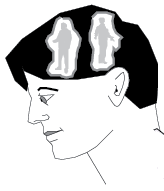There could even be two separate virtual people in the same brain, each of whomm understands a different language. The fact that none of the three people (the two virtual people and the man who internalized them) can translate their own language into the others' languages says nothing about their individual abililities to speak and understand their own languages.

David Cole, 1991.
Virtual Person: A formal implementation of the structure of human understanding. A virtual person is like a virtual machine, which is a machine that emulates another machine by instantiating its formal structure. For example, an old Atari video game console can be run as a virtual macine on a brand new Pentium computer.